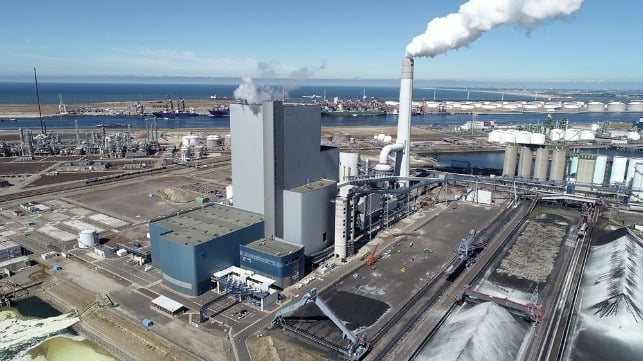Port of Rotterdam Studies Potential for Large Green Hydrogen Plant

Believing there will be strong demand for sustainable hydrogen from the shipping industry and businesses in the region, the Port of Rotterdam and German energy company Uniper are starting a feasibility study to investigate the possibilities of large-scale production of green hydrogen in the Maasvlakte area in Rotterdam. The study, which will be completed this summer, will explore leveraging the strong resources of the region to become a leader in the commercialization of green hydrogen.
“Our location at Maasvlakte is the perfect place for large-scale production of green hydrogen,” says Andreas Schierenbeck, CEO of Uniper. “This is where everything comes together, large amounts of renewable energy, the required infrastructure, and industrial customers. A better place for green hydrogen production is hardly imaginable.”
The production of green hydrogen through electrolysis uses renewable energy to split water into hydrogen and oxygen. Renewable electricity from offshore wind farms will come ashore at Maasvlakte, and various relevant facilities are already available on the Uniper site.
“The production of green hydrogen on the Uniper site fits in perfectly with the strategy of the Port Authority to make the industry more sustainable,” says Allard Castelein, CEO Port of Rotterdam Authority. “Green hydrogen is a sustainable alternative for natural gas to realize high temperatures. Besides, it is an important sustainable feedstock for the chemical industry.”
The partners outlined a concept for a hydrogen plant with an initial capacity of 100 MW by 2025. Over time they would then expand the capacity to 500 MW.
As part of the feasibility study, they will explore the potential market for sustainable hydrogen, both in the Rotterdam port area and in Germany. The project team is also looking at options for import, storage, and export at Maasvlakte. They will also explore using pipelines to deliver the hydrogen to the major industrial complexes in Germany’s North Rhine-Westphalia region.
After the successful prequalification for the EU IPCEI (Important Projects of Common European Interest) program, over the next few months, the conceptual design and the technical dimensions of the new hydrogen plant will be developed.
Rotterdam’s exploration for a large hydrogen facility joins other ports in the region that have also announced plans to develop hydrogen facilities following a similar timeline. In January 2021, Shell and Mitsubishi Heavy Industries, along with Sweden’s Vattenfall energy company and municipal company Wärme Hamburg sign a letter of intent for a project to produce 100 MW of hydrogen from wind and solar power to make the Port of Hamburg a green energy hub by 2025.

that matters most
Get the latest maritime news delivered to your inbox daily.
The Port of Oostende in Belgium, DEME Concessions, and PMV have also formed a partnership to build a green hydrogen plant in the port area with an electrolyzer of around 50 MW. This project is expected to start initial operations by 2022 with the commercial plant to be operational by 2025.
Other anticipated projects centered on ports in the region include the North Sea Port where planning for a green hydrogen plant with a 25 MV electrolysis unit using commercially available technology is proceeding. It will incorporate storage, refueling, and distribution facilities.
